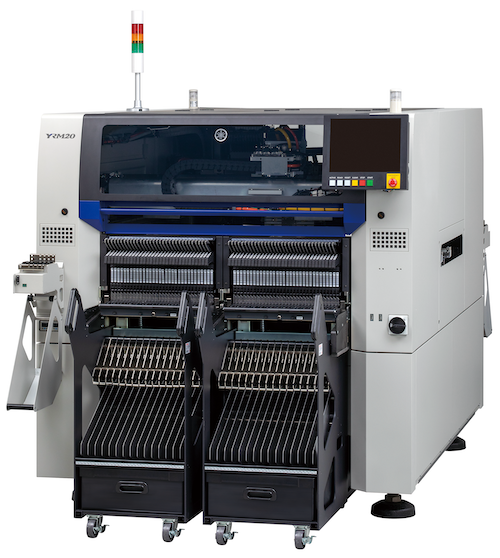Historically, surface-mount production lines have been built to handle clearly defined customer demands: high-volume/low-mix for consumer products and low-volume/high-mix requirements from industrial markets. But what happens when both the volume and mix are flexible and curveballs like unusual components and ultra-high quality expectations further complicate the picture?
Automotive electrification is an established trend that continues to accelerate as car makers seek to differentiate their products in the marketplace and meet ever-toughening legislative demands for greater safety and lower environmental impact. Advanced technologies like artificial intelligence and millimetre-wave radar – until now mostly found in aerospace and cutting-edge research – are now on the road and affordable to consumers. The global automotive electronics market is worth more than $270 billion according to market research by Statista[1].
While clearly presenting a tremendous opportunity for both the automotive and electronics industries, this relentless electrification also brings acute challenges. Consumer expectations from the technology are sky-high – always demanding something new and exciting – while on the other hand the industry’s well-known focus on reliability and safety means that proven standards and technologies tend to change slowly.
Flexibility and Efficiency
On the production line, large components and connectors that conform to legacy standards must be handled alongside the latest SMD chips, application processors, and power semiconductors in advanced surface-mount packages.
Yamaha Robotics SMT Division is enabling the industry to rise to the challenge with its latest-generation YR-series assembly solutions. The YRM20 flexible mounter can handle high mix and high volume as well as supporting the general trend towards smart manufacturing.
Early customers have appreciated important new features of the YRM20, such as its high-mix (HM) placement head that can handle components ranging from 0201-size chip resistors to components as large as 55mm x 100mm. This greatly simplifies the challenge of placing large components like automotive board-edge connectors and tall capacitors in high-power assemblies such as electric power steering (EPS) controllers. In the past, it has been necessary to setup a dedicated machine specifically for placing these types of components. The YRM20 can handle almost anything, without needing to stop the line and change the head. In addition, its extended feeder capacity minimises changeover workload, while compact feeder carriages increase efficiency on the factory floor.
Yamaha High Efficiency Modular YRM20
Traceability
Another defining challenge within the automotive electronics sector is the demand for traceability that accompanies the industry’s high expectations for quality, reliability, and safety. With traditional SMT equipment, manufacturers can struggle to trace the causes of defects found in an inspection process after the reflow or the downstream processes. Yamaha’s M2M communications, proven and integrated in the YRM20 and all machines in the Company’s 1 STOP SMART SOLUTION, traceability and N-point verification take almost all the effort out of identifying the causes of defects. When any defect is found, supervisors can go straight to the root cause and fix it quickly before other assemblies are produced with the same fault. It boosts productivity and enhances quality, preventing any defective units that may come off the SMT line from escaping the factory.
Yamaha’s YSUP intelligent factory software supports machine-to-machine communication and has time-saving features such as automated placement-program generation and mounting simulations and comprises flexible packages for monitoring, analysis, and traceability. “The YSUP environment connects all machines in the line and helps uses quickly create and optimise their programs,” explains Daisuke Yoshihara, Yamaha Sales General Manager “The intelligent factory tools enhance control and connect with enterprise-level software to aid resource management and scheduling. The Traceability package captures real-time data to pinpoint defects and their causes, and can be augmented with the All Image Tracer for analysing component mounting quality.”
1 STOP SMART SOLUTION
With these advantages in their surface-mount production facilities, electronic manufacturers serving car makers and automotive tier-1 suppliers can handle the wide variety of product types typical of this market while maintaining a fast cycle time and minimising line stops and changeovers. The result significantly increases productivity, even when dealing with odd-shaped or tall components. Reducing changeovers raises equipment utilisation while also reducing operational errors.
The traceability function makes it possible to locate defective points and identify the causes of defects in a much shorter time than ordinal lines. “Traceability is an issue that extends throughout the automotive electronics supply chain,” adds Yoshihara. “YSUP Traceability helps manufacturing businesses capture all the information they need quickly and efficiently.”
As advanced electronic systems continue to extend throughout forthcoming generations of vehicles, managing functions from infotainment, comfort, and lighting, to powertrain and autonomous driving, Yamaha’s advanced assembly solutions provide flexibility and control for manufacturers to deliver cost-effective, high-quality solutions.
About Yamaha Robotics SMT Section
Yamaha Surface Mount Technology (SMT) Section, a subdivision of Yamaha Motor Robotics Business Unit in Yamaha Motor Corporation, produces a complete selection of equipment for high-speed inline electronic assembly. This 1 STOP SMART SOLUTION includes solder paste printers, component mounters, 3D solder paste inspection machines, 3D PCB inspection machines, flip-chip hybrid placers, dispensers, intelligent component storage, and management software.
Bringing the Yamaha way to electronics manufacturing, these systems prioritize intuitive operator interaction, efficient coordination between all inline processes, and modularity enabling users to meet the latest manufacturing demands. Group competencies in servo-motor control and image recognition for vision (camera) systems ensure extreme accuracy with high speed.
The current product line includes the latest YR equipment generation, with advanced automated features for programming, setup, and changeovers, and new YSUP management software with state-of-the-art graphics and built-in data analytics.
Combining design and engineering, manufacture, sales, and service competencies, Yamaha SMT Section ensures operational efficiency and easy access to support for customers and partners. With regional offices in Japan, China, Southeast Asia, Europe and North America, the company provides truly global presence.


